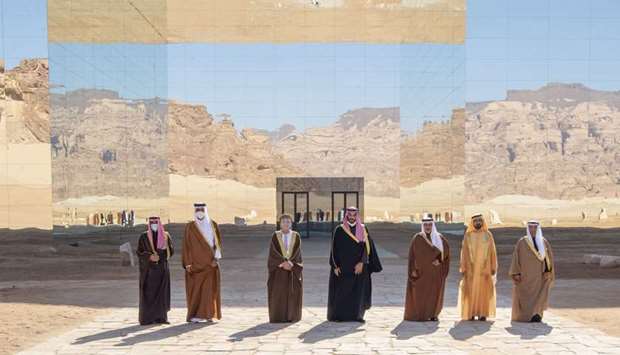The 41st session of the Supreme Council of the Co-operation Council for the Arab States of the Gulf (GCC), held on Tuesday at Maraya Center in Al-Ula governorate in Saudi Arabia, affirmed the GCC leaders' keenness to enhance the council's gains and implement the aspirations of the GCC citizens, in addition to easing all the hurdles that stand in the way of a united front.
The Al-Ula Declaration issued at the Supreme GCC, 'Sultan Qaboos and Sheikh Sabah' Summit, has stressed the sublime objectives of the GCC, stipulated in its founding system to achieve co-operation, integration and links among the GCC countries in all fields to attain their unity and enhance their regional and international role, and work as a one political and economic group to participate in attaining security, peace, stability and prosperity in the region.
The citizens of the region's countries are hopeful that Al-Ula Declaration will restore normality to joint action and enhance the friendly and brotherly ties among the peoples. Egypt signing the Declaration affirms the depth of its brotherly relations with the GCC countries, as part of the main objectives of co-ordination, co-operation and integration among the GCC countries and the Arab Nation.
The challenge of Covid-19 has revealed what can be achieved through co-operation among the world countries to fight this pandemic. The G20 has made unprecedented achievements in this field during the presidency of Saudi Arabia.
• The full and accurate implementation of the Custodian of the Two Holy Mosques King Salman bin Abdulaziz of Saudi Arabia, that was approved by the GCC Supreme Council in its 36th round in December 2015, according to a defined time schedule and accurately followed up, including the completion of the components of the economic unity, and the joint defence and security systems, in addition to shaping a unified foreign policy.
• Activation of the role of "The GCC Center for Disease Prevention and Control", established at this summit, out of the vision of the Custodian of the Two Holy Mosques, and quickly enabling it to co-ordinate the joint GCC work to fight Covid-19 and other pandemics.
• Completion of the requirements for the Customs Unity and The GCC Joint Market, and achieving the full economic integration for the GCC citizens including granting the GCC citizens the freedom to work, move, invest and receive equal health care and education, building the GCC Railways network, the water and food security system, encouraging joint ventures and the domiciliation of the GCC investment.
• Benefiting from the advanced tools of co-operation, developed within the framework of the G20 during the presidency of Saudi Arabia, in all fields including the stimulation of economy, and involving the business sector, and civil society organisations, in addition to empowering women and young people in a greater way in economic development, and encouraging initiatives related to the digital economy. The GCC General Secretariat shall be tasked with the follow-up and implementation of the plans and programmes, in co-operation with specialist and expert agencies.
• Development of the technical capabilities of government departments, including artificial intelligence to guarantee the speedy and efficient implementation of the related services and procedures, and development of the educational programmes, healthcare and digital trade, in addition to enhancing the co-operation among the GCC organisations and the Digital Co-operation Organisation founded in 2020 to attain the interests of the GCC countries.
• Enhancing the tools of the judiciary, transparency and accountability and fighting corruption through the joint GCC action across all the departments of GCC and its offices and specialised organisations.
• Enhancing the military integration among the GCC countries under the supervision of the Joint Defence Committee, the Supreme Military Committee, and the Unified GCC Military Command to counter the new challenges.
• Continuation of the procedures taken by the GCC countries and the G20 to fight Covid-19 and mitigate its local and regional consequences, including helping the countries less developed in the health and economic fields.
• Enhancing the regional and international role of the GCC through unifying the political stands and developing strategic partnerships among the Gulf countries, other countries and other regional and international organisations in a way that serves the joint interests.

